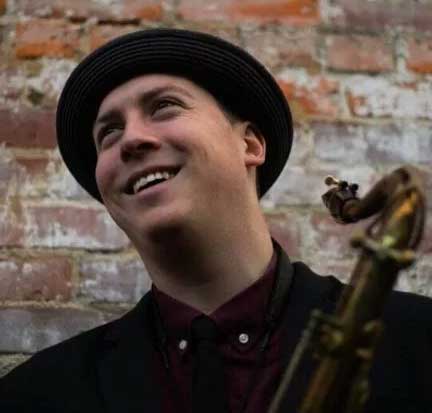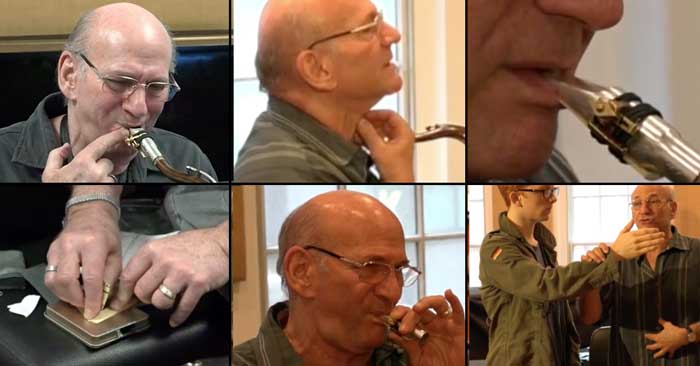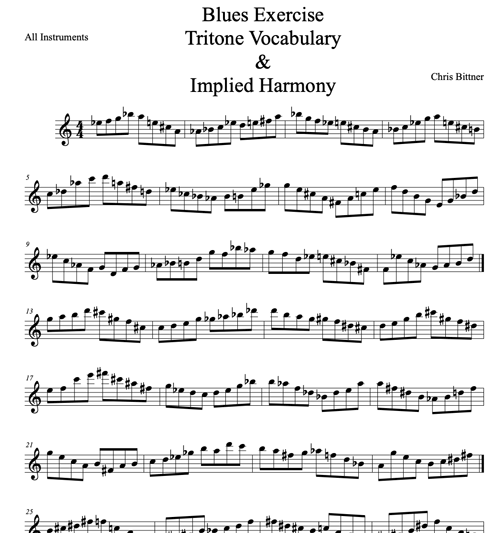Saxophonist Chris Bittner’s Musical Journey, Plus a Tritone Vocabulary and Implied Harmony Exercise
Introduction
I am continuously speaking to saxophone players on the scene today and am always asking “are there any new players I should be checking out?” Recently, the name that has come up quite a bit is a saxophonist named Chris Bittner.
Fortunately at NAMM 2020, I ran into Derek Cliff Crane who runs SaxSpy and he was nice enough to put me in contact with Chris. For those of you who already don’t know much about Chris, here are some key details to note on Chris:
- Is originally from North Carolina and has played all over the east coast
- Is also a composer
- Plays in styles ranging from Jazz to R&B, Folk, Gospel, and Country
- Is based in NYC and can be seen as a sideman at NYC Clubs such as Fat Cat, Dizzy’s Coca-Cola Club, Smalls, Rockwood Music Hall, Blue Note Jazz Club, Zinc Bar, and many more
- Has performed internationally with his quartet at the Bern Jazz Festival in Bern, Switzerland.
- Is a recent Juilliard graduate, and has had the opportunity to play alongside jazz greats such as Jimmy Heath, Bill Charlap, Herlin Riley, Jon Faddis, Rodney Whitaker, Etienne Charles, Aaron Diehl, Donny McCaslin, and the list goes on
Interview
ZS: What interested you in studying music and why the saxophone?
CB: I started playing the saxophone in the 6th grade. When I began middle school band I actually wanted to play the trombone, which I find hilarious now. Nobody in my family is a musician, but my dad was really into swing era big bands and told me that I should play the saxophone instead so I could play jazz. Little did he, or even I, know at that time that you could play jazz on the trombone. Per my dad’s advice, I decided to play the saxophone and started on alto, with my first saxophone being a King Empire student alto.
In middle school, everyone on saxophone played the alto because that is all the school had. In 7th grade, my middle school got in a shipment of tenors and a baritone. Two of my friends ended up switching from alto to tenor and I decided to play baritone; but at that time I didn’t even really know there were different types of saxophones (I thought there was just one).
I continued to play baritone up until freshmen year of high school, and then, as I learned more, I decided that tenor was the horn I really wanted to play. When I started high school my parents bought me a Yamaha 62 Mark II which I still have today.
Throughout middle school and high school I never had a private teacher so I mainly learned from my band director, CD’s, and YouTube. I came from a really small town in North Carolina so there was not much available in terms of music that involved the saxophone.
In my sophomore year of high school, I went to this jazz workshop at the University of North Carolina – Wilmington. It was at this jazz workshop that I met other saxophone players and was told I needed to switch from playing my Yamaha 4C mouthpiece that came with my 62 to a “jazz mouthpiece” and the one that was recommended the most was a metal Otto Link 7*. At that time I had no idea what that mouthpiece even was. After switching to the Otto link, I started going down that rabbit hole of trying different mouthpiece and reed combinations until I settled on a Jody Jazz hard rubber which I played throughout high school.
Throughout 10th, 11th, and 12th grade I tried out for all-region (similar to all-county) as well as all-state and made it into both bands on tenor each year. Playing in these bands really motivated me and made me realize that I wanted to pursue music as a career.
After graduating high school, I decided to study at UNC-Greensboro. People often ask me why I didn’t audition at bigger schools like Manhattan School of Music, Julliard, William Paterson, Temple, etc, for undergrad, and the reason is, I simply didn’t know these schools existed nor was I good enough at that time to even get in. I wasn’t on that track, if you will.
In my opinion, UNCG is the best school for studying music in North Carolina. UNCG and NCCU are both strong for music, but in my opinion UNCG has the best overall program in the state, arguably the southeast. At UNC-Greensboro, my primary saxophone teacher was Chad Eby who is a fantastic teacher and player. When I first started studying with Chad he helped me identify some areas I needed to work on right away. I always had pretty good technique but throughout high school I would just play a bunch of fast lines but they did not have any direction or logic. “Bullshit” essentially. My tone was not fully developed at the time. A great piece of advice that Chad gave me and still sticks with me today is if you are doing something that is an artistic choice, keep doing it. But, if you are only doing something because it is a limitation and you don’t have any other way to do it, then that is not good.
While studying with Chad we mainly worked on transcriptions and tune learning by ear. For four years I essentially did a transcription a week which was the bulk of my lessons which really helped.
After graduating UNC-Greensboro I went straight to get my Masters in Music at Juilliard, but originally had no intention of going to graduate school. My first lesson of my last semester with Chad, he said “Well this is it, you have been here for four years, I have given you all I can give you, what are you going to do now?”.
At that point, I did not know what I was going to do but had the idea about moving to Chicago to get my feet wet playing in a bigger city and eventually moving to New York. In this lesson, Chad recommended that I attend graduate school and since I respected his opinion so much, I thought “ok, I’ll go to graduate school”. At this time, I had not put any effort where I should or wanted to go to graduate school so I asked Chad where do you recommend I study and Chad told me Juilliard and Michigan State. I was accepted to both graduate programs but I chose Juilliard because I would be in NYC, plus the fact that Juilliard is a well-known prestigious school. On top of that, I got to study with Ron Blake who is both a great teacher in addition to being an incredible player.
When I first started studying at Juilliard, I went in with the wrong mindset, which was very self-defeating and questioning what was I doing there. With that being said, throughout the two-year program, I really started to learn from being surrounded by such great players on all instruments, which forced me to grow and my mindset improved as a result.
After graduating Juilliard in 2017, I stayed another year in New York which was hard for me because I no longer had the school structure and was not really gigging that much, so I was just mainly shedding. Even after school, I was still in this timid place where I did not want to go to these sessions and sound bad (I have now learned and grown so much that looking back on this time, that fear seems so silly to me), so I eventually decided I needed to go back home and get my head on straight.
In 2019, I decided to move back to Greensboro and gigged a lot, which allowed me to figure things out, and just this past September I moved back to NYC.
ZS: As a teacher and player, what do you find is the most overlooked topic that many students, beginners to advanced, rarely learn as they are studying the saxophone?
CB: I like to use the words, “melodic freedom”. This is the willingness to make mistakes and willingness to play notes that are incorrect, which is something I see many students in my lessons struggle to grasp. From studying with Chad, one thing I learned is that melody trumps harmony. What I mean is if you are playing something that is melodically sound, has integrity, has conviction, and is a melodic statement that stands alone on itself, then it’s acceptable to go outside the harmony.
What’s important to understand with melodic freedom is if the melodic statement tends to not agree with the harmony but is going somewhere and resolves when the resolution needs to happen – which is obviously very important(!), then I think it’s completely acceptable to go outside of the harmony.
ZS: Who are your influences today?
CB: Trane is probably my biggest hero but also I like listening to Sonny Rollins, Joe Lovano, Stephen Riley, Branford Marsalis, Rich Perry, Ned Goold, Ralph Bowen, Michael Brecker and Chris Potter. I have done many transcriptions of older players like Lester, Ben, Hawk, and absolutely love what they do, but they aren’t my main source of influence or inspiration.
ZS: What materials or exercises are you working on today?
CB: My blues concept – playing shapes that are outside of the norm when you are playing on a blues, but in a way that I as well as the listener should be able to recognize that it is a blues.
Blues Exercise – Tritone Vocabulary & Implied Harmony
Click here to download the full exercise in print-friendly PDF version.
ZS: What did you find most challenging after you graduated from under-grad and graduate school?
CB: Finding gigs and being happy are things that I struggled with. I did take one jazz business class at Juilliard that taught me some useful things like, how to plan a European tour, but this was so far down the line in someone’s career, whereas I was really interested in knowing, “how do I hustle a restaurant gig in NYC?”.
I think Adam Larson is someone who has a good understanding of the music business and how to maneuver throughout your career. I think graduate school did help me a progress my musical ability but from a business perspective I wish there were more jazz business courses that discussed things such as hunting for gigs, managing your social media, creating your website, promoting yourself, teaching via Skype, etc.
ZS: As a young player on the scene today, do you think young saxophonists and veterans can just get by with just playing music or do you see teaching as a necessity to get by as a working musician?
CB: For me, teaching students inspires me to want to practice more. It’s a check up on myself. If you don’t teach, that’s fine but I think teaching is important to being a musician. I think playing music and teaching music can go hand and hand.
ZS: What projects are you currently working on right now?
CB: I am working on my first album. The idea and material is there but right now I am just saving money to release my first album, which I will dedicate to my dad. In addition, I try to write every day and put all my ideas in my notebook which I tend to revisit at a later date.
ZS: What is your current setup today?
CB:
Saxophone: Selmer Mark VI (100,XXX)- graduation gift from my parents before I started at Juilliard
Mouthpiece: Vandoren Jumbo Java T95
Reed: Vandoren (V12 or V21) – Strength: 3
Ligature: Vandoren Optimum
Strap: Vandoren Deluxe Strap
Case: Bam Cabine
Repair: John Leadbetter







